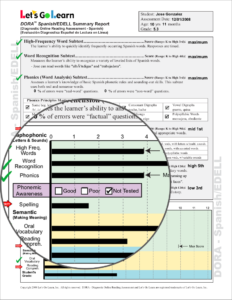Assessing reading skills in ELL students
English Language Learners (ELLs) refer to students who are non-native speakers of English. These students come from diverse language-based and cultural backgrounds and may have varying levels of proficiency in the English language. ELLs may also be referred to as English learners, second language learners, or bilingual students.
Overview of Diagnostic Assessing Reading Skills in ELLs
Accurately assessing the reading skills of English Language Learners (ELLs) is important for understanding their academic progress and providing appropriate support. Assessments play a vital role in gauging the language proficiency and content knowledge of ELL students, allowing educators to determine their individual needs and develop targeted instruction.
ELL students face unique challenges in reading comprehension due to their limited English proficiency and the academic content knowledge gap. These factors can make it difficult for students to fully grasp complex texts and really show their understanding. It is essential to have effective assessments that can accurately measure the reading abilities of ELLs in a fair and meaningful way.
ELLs often struggle with language proficiency, which can significantly impact their performance on assessments. Let’s Go Learn offers assessment solutions that are sensitive to language proficiency levels. Their assessments are designed to effectively evaluate the language skills and comprehension abilities of ELLs, providing accurate insights for educators and minimizing the impact of language barriers on assessment outcomes. By utilizing Let’s Go Learn’s assessment tools, educators can gain an understanding of ELLs’ reading skills and tailor their instruction accordingly.
Challenges for ELLs
ELLs face unique challenges in reading skills because of their limited English ability and the academic knowledge gap. These challenges can affect their ability to fully comprehend complicated texts and demonstrate their understanding. ELLs may struggle with decoding unfamiliar words, understanding the variations of the English language, and making connections between their native language and English. It is important for educators to recognize and address these challenges in order to provide appropriate support and instruction to help ELLs develop their reading skills and achieve success.
Writing Skills and Primary Language Interference
Developing writing proficiency can be a big challenge for English Language Learners (ELLs) because of the influence of their native language. The influence from their native language can be seen all over, including grammar, sentence structure, and vocabulary. ELLs might face difficulties in really understanding the details of English grammar and forming sentences accurately. Providing instruction on English grammar and sentence structure can help ELLs better understand the differences between their primary language and English. Peer collaboration and feedback can be important in reducing primary language interference. Pairing ELLs with native English speakers or more proficient peers allows for language modeling and guided support. It lets ELLs practice their writing skills and receive constructive feedback to improve their language usage.

Formal/Standardized Tests
Lets Go Learn’s English Learner Assessments and Instruction tools are tailored to meet the unique needs of ELLs. They utilize a structured format and scoring criteria to ensure all students are evaluated using the same standards, allowing for reliable and valid comparisons across individuals and groups. The assessments collect data about ELLs’ reading abilities, offering comprehensive insights into various aspects of their language skills, including comprehension, vocabulary, fluency, and decoding skills.
The data collected from these assessments goes beyond test scores. It serves as a powerful tool to help educators make informed recommendations for appropriate instructional practices and interventions. If a student demonstrates weaknesses in vocabulary acquisition, the results from these assessments can pinpoint the need for targeted vocabulary instruction or specific interventions to support their language development effectively.
Considerations when Choosing an Assessment Tool for ELLs
When choosing an assessment tool for English Language Learners (ELLs), there are several important considerations to keep in mind. It is important to select a tool that takes into account the unique needs and challenges of ELLs. This includes considering their level of English proficiency, as well as their primary language and literacy development in that language. Additionally, it is important to choose an assessment tool that provides a clear understanding of the academic content being assessed, rather than solely focusing on language skills. This ensures that ELLs are being assessed on their knowledge and comprehension, rather than just their ability to express themselves in English.
Type of Assessment Needed
Let’s Go Learn does this process by conducting a precise analysis of each student’s reading skills. The comprehensive diagnosis covers high-frequency words, phonemic awareness, phonics, fluency, spelling, vocabulary development, and reading comprehension. This data collection supports IEP writing and goal setting and informs instructional strategies.
The system then assigns a personalized learning path for each student based on their individual needs. Instruction is provided through engaging forms such as animations, songs, and graphics, ensuring accessibility and engagement for all students. To further personalize the learning journey, Let’s Go Learn uses automated formative assessments that continuously adjust learning paths based on ongoing assessment data.
Considering the academic content of ELL students is very important in planning the assessment process. It is crucial to provide assessments that are accessible and meaningful to the students, taking into account their cultural and linguistic backgrounds. This makes sure that the assessments accurately measure their reading skills, rather than testing their knowledge of unfamiliar content.


Leave A Comment